Global Warming's Influence on Fishery and Tourism in North-West Spain
VerifiedAdded on 2019/11/26
|6
|1409
|156
Essay
AI Summary
This essay examines the multifaceted effects of global warming on the fishery and tourism industries in North West Spain. It delves into how rising temperatures and altered rainfall patterns, driven by global warming, have significantly impacted the marine ecosystem, leading to changes in stream flow, ocean currents, and the levels of carbon, nitrogen, and CO2 in the water. These changes pose a threat to various marine species, affecting the anchovy fishery, a vital economic activity in the region. The essay explores the subsequent impacts on the tourism sector, which, while benefiting from increased water temperatures and attracting more visitors, faces challenges from the degradation of coastal environments. It further discusses the Spanish government's and the European Commission's responses, including regulations on fishing and biodiversity management, and the application of Regulation theory to justify these policies. The essay concludes by highlighting the need for sustainable practices and effective strategies to mitigate the adverse effects of global warming on both the environment and the economy of North West Spain.
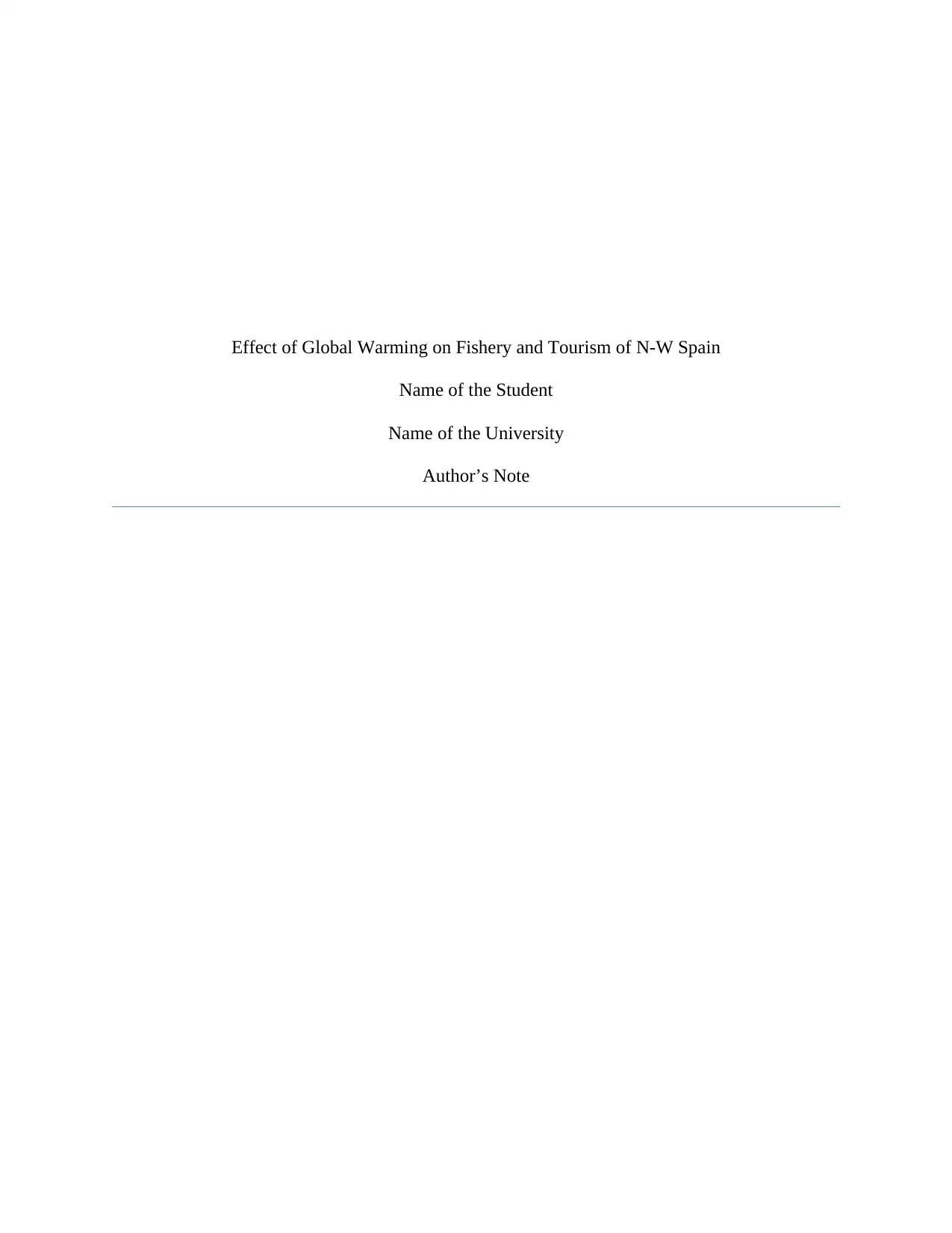
Effect of Global Warming on Fishery and Tourism of N-W Spain
Name of the Student
Name of the University
Author’s Note
Name of the Student
Name of the University
Author’s Note
Paraphrase This Document
Need a fresh take? Get an instant paraphrase of this document with our AI Paraphraser
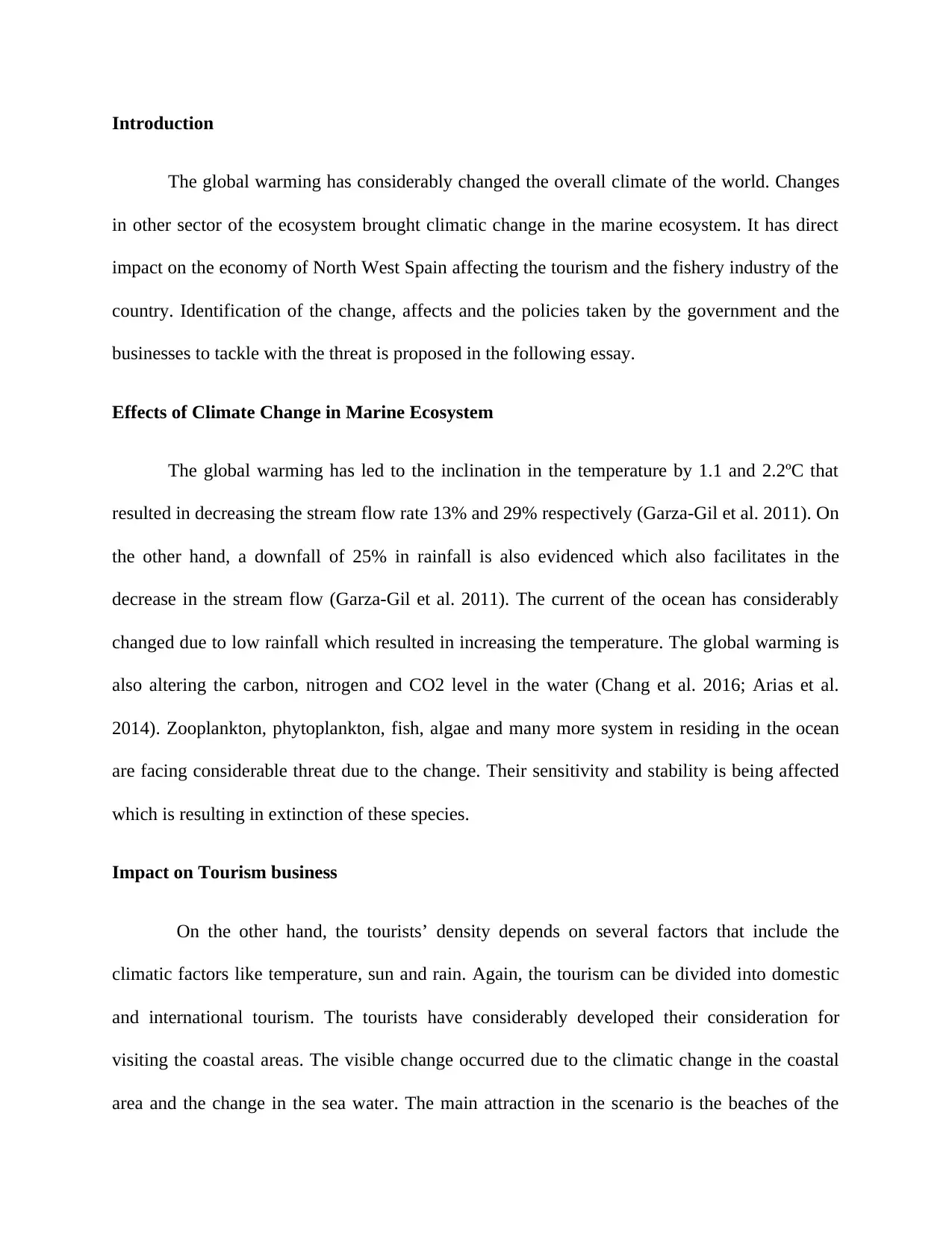
Introduction
The global warming has considerably changed the overall climate of the world. Changes
in other sector of the ecosystem brought climatic change in the marine ecosystem. It has direct
impact on the economy of North West Spain affecting the tourism and the fishery industry of the
country. Identification of the change, affects and the policies taken by the government and the
businesses to tackle with the threat is proposed in the following essay.
Effects of Climate Change in Marine Ecosystem
The global warming has led to the inclination in the temperature by 1.1 and 2.2ºC that
resulted in decreasing the stream flow rate 13% and 29% respectively (Garza-Gil et al. 2011). On
the other hand, a downfall of 25% in rainfall is also evidenced which also facilitates in the
decrease in the stream flow (Garza-Gil et al. 2011). The current of the ocean has considerably
changed due to low rainfall which resulted in increasing the temperature. The global warming is
also altering the carbon, nitrogen and CO2 level in the water (Chang et al. 2016; Arias et al.
2014). Zooplankton, phytoplankton, fish, algae and many more system in residing in the ocean
are facing considerable threat due to the change. Their sensitivity and stability is being affected
which is resulting in extinction of these species.
Impact on Tourism business
On the other hand, the tourists’ density depends on several factors that include the
climatic factors like temperature, sun and rain. Again, the tourism can be divided into domestic
and international tourism. The tourists have considerably developed their consideration for
visiting the coastal areas. The visible change occurred due to the climatic change in the coastal
area and the change in the sea water. The main attraction in the scenario is the beaches of the
The global warming has considerably changed the overall climate of the world. Changes
in other sector of the ecosystem brought climatic change in the marine ecosystem. It has direct
impact on the economy of North West Spain affecting the tourism and the fishery industry of the
country. Identification of the change, affects and the policies taken by the government and the
businesses to tackle with the threat is proposed in the following essay.
Effects of Climate Change in Marine Ecosystem
The global warming has led to the inclination in the temperature by 1.1 and 2.2ºC that
resulted in decreasing the stream flow rate 13% and 29% respectively (Garza-Gil et al. 2011). On
the other hand, a downfall of 25% in rainfall is also evidenced which also facilitates in the
decrease in the stream flow (Garza-Gil et al. 2011). The current of the ocean has considerably
changed due to low rainfall which resulted in increasing the temperature. The global warming is
also altering the carbon, nitrogen and CO2 level in the water (Chang et al. 2016; Arias et al.
2014). Zooplankton, phytoplankton, fish, algae and many more system in residing in the ocean
are facing considerable threat due to the change. Their sensitivity and stability is being affected
which is resulting in extinction of these species.
Impact on Tourism business
On the other hand, the tourists’ density depends on several factors that include the
climatic factors like temperature, sun and rain. Again, the tourism can be divided into domestic
and international tourism. The tourists have considerably developed their consideration for
visiting the coastal areas. The visible change occurred due to the climatic change in the coastal
area and the change in the sea water. The main attraction in the scenario is the beaches of the
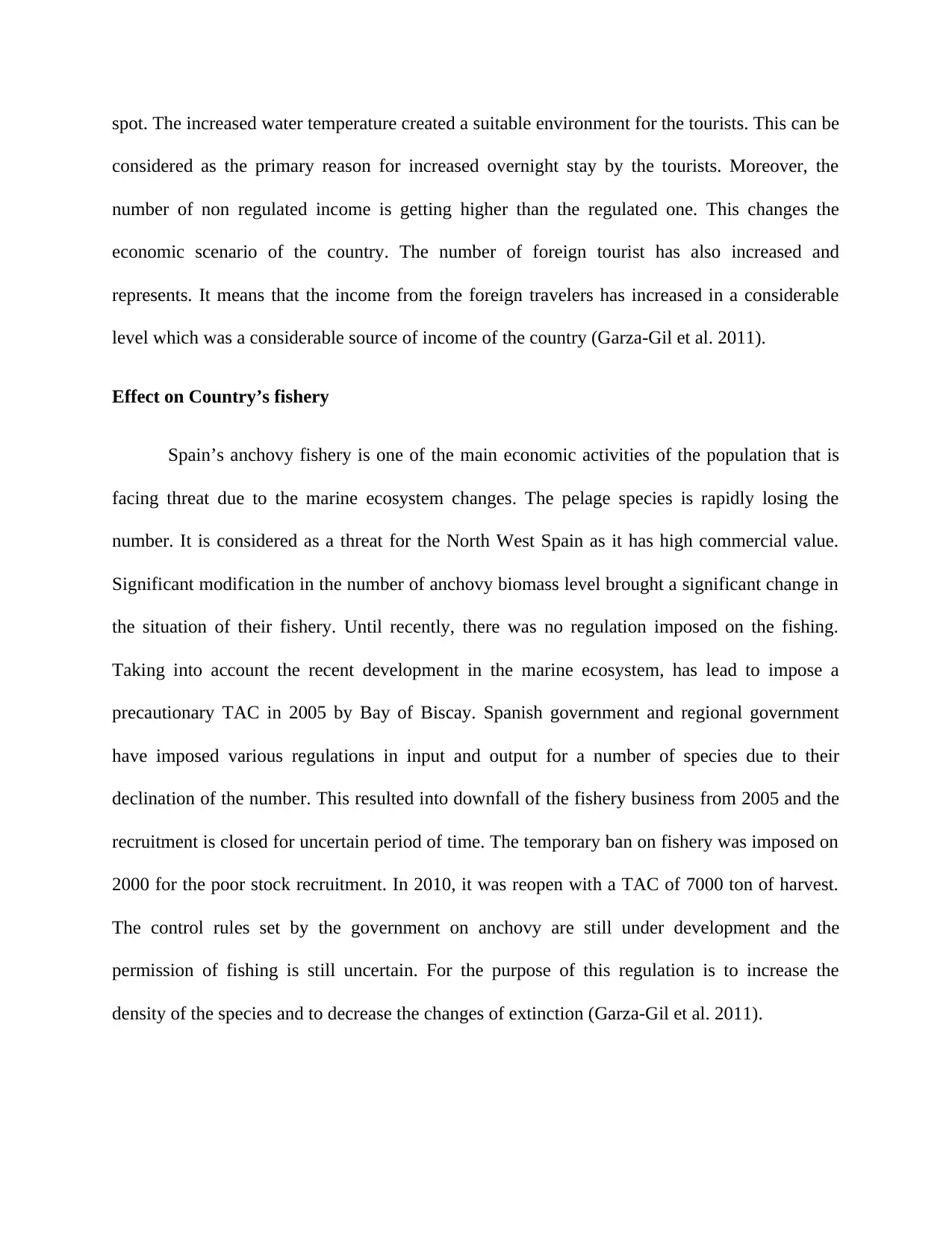
spot. The increased water temperature created a suitable environment for the tourists. This can be
considered as the primary reason for increased overnight stay by the tourists. Moreover, the
number of non regulated income is getting higher than the regulated one. This changes the
economic scenario of the country. The number of foreign tourist has also increased and
represents. It means that the income from the foreign travelers has increased in a considerable
level which was a considerable source of income of the country (Garza-Gil et al. 2011).
Effect on Country’s fishery
Spain’s anchovy fishery is one of the main economic activities of the population that is
facing threat due to the marine ecosystem changes. The pelage species is rapidly losing the
number. It is considered as a threat for the North West Spain as it has high commercial value.
Significant modification in the number of anchovy biomass level brought a significant change in
the situation of their fishery. Until recently, there was no regulation imposed on the fishing.
Taking into account the recent development in the marine ecosystem, has lead to impose a
precautionary TAC in 2005 by Bay of Biscay. Spanish government and regional government
have imposed various regulations in input and output for a number of species due to their
declination of the number. This resulted into downfall of the fishery business from 2005 and the
recruitment is closed for uncertain period of time. The temporary ban on fishery was imposed on
2000 for the poor stock recruitment. In 2010, it was reopen with a TAC of 7000 ton of harvest.
The control rules set by the government on anchovy are still under development and the
permission of fishing is still uncertain. For the purpose of this regulation is to increase the
density of the species and to decrease the changes of extinction (Garza-Gil et al. 2011).
considered as the primary reason for increased overnight stay by the tourists. Moreover, the
number of non regulated income is getting higher than the regulated one. This changes the
economic scenario of the country. The number of foreign tourist has also increased and
represents. It means that the income from the foreign travelers has increased in a considerable
level which was a considerable source of income of the country (Garza-Gil et al. 2011).
Effect on Country’s fishery
Spain’s anchovy fishery is one of the main economic activities of the population that is
facing threat due to the marine ecosystem changes. The pelage species is rapidly losing the
number. It is considered as a threat for the North West Spain as it has high commercial value.
Significant modification in the number of anchovy biomass level brought a significant change in
the situation of their fishery. Until recently, there was no regulation imposed on the fishing.
Taking into account the recent development in the marine ecosystem, has lead to impose a
precautionary TAC in 2005 by Bay of Biscay. Spanish government and regional government
have imposed various regulations in input and output for a number of species due to their
declination of the number. This resulted into downfall of the fishery business from 2005 and the
recruitment is closed for uncertain period of time. The temporary ban on fishery was imposed on
2000 for the poor stock recruitment. In 2010, it was reopen with a TAC of 7000 ton of harvest.
The control rules set by the government on anchovy are still under development and the
permission of fishing is still uncertain. For the purpose of this regulation is to increase the
density of the species and to decrease the changes of extinction (Garza-Gil et al. 2011).
⊘ This is a preview!⊘
Do you want full access?
Subscribe today to unlock all pages.

Trusted by 1+ million students worldwide
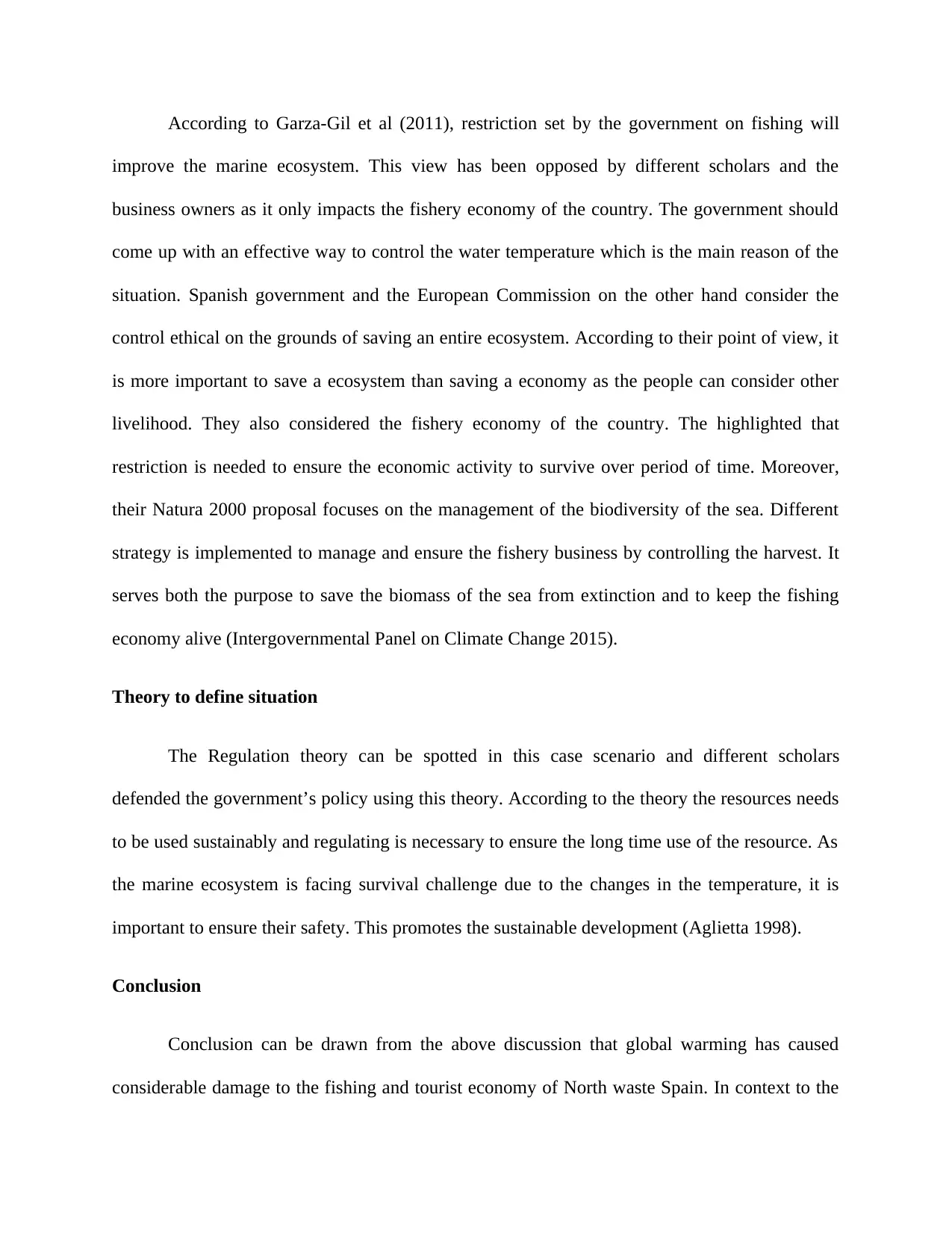
According to Garza-Gil et al (2011), restriction set by the government on fishing will
improve the marine ecosystem. This view has been opposed by different scholars and the
business owners as it only impacts the fishery economy of the country. The government should
come up with an effective way to control the water temperature which is the main reason of the
situation. Spanish government and the European Commission on the other hand consider the
control ethical on the grounds of saving an entire ecosystem. According to their point of view, it
is more important to save a ecosystem than saving a economy as the people can consider other
livelihood. They also considered the fishery economy of the country. The highlighted that
restriction is needed to ensure the economic activity to survive over period of time. Moreover,
their Natura 2000 proposal focuses on the management of the biodiversity of the sea. Different
strategy is implemented to manage and ensure the fishery business by controlling the harvest. It
serves both the purpose to save the biomass of the sea from extinction and to keep the fishing
economy alive (Intergovernmental Panel on Climate Change 2015).
Theory to define situation
The Regulation theory can be spotted in this case scenario and different scholars
defended the government’s policy using this theory. According to the theory the resources needs
to be used sustainably and regulating is necessary to ensure the long time use of the resource. As
the marine ecosystem is facing survival challenge due to the changes in the temperature, it is
important to ensure their safety. This promotes the sustainable development (Aglietta 1998).
Conclusion
Conclusion can be drawn from the above discussion that global warming has caused
considerable damage to the fishing and tourist economy of North waste Spain. In context to the
improve the marine ecosystem. This view has been opposed by different scholars and the
business owners as it only impacts the fishery economy of the country. The government should
come up with an effective way to control the water temperature which is the main reason of the
situation. Spanish government and the European Commission on the other hand consider the
control ethical on the grounds of saving an entire ecosystem. According to their point of view, it
is more important to save a ecosystem than saving a economy as the people can consider other
livelihood. They also considered the fishery economy of the country. The highlighted that
restriction is needed to ensure the economic activity to survive over period of time. Moreover,
their Natura 2000 proposal focuses on the management of the biodiversity of the sea. Different
strategy is implemented to manage and ensure the fishery business by controlling the harvest. It
serves both the purpose to save the biomass of the sea from extinction and to keep the fishing
economy alive (Intergovernmental Panel on Climate Change 2015).
Theory to define situation
The Regulation theory can be spotted in this case scenario and different scholars
defended the government’s policy using this theory. According to the theory the resources needs
to be used sustainably and regulating is necessary to ensure the long time use of the resource. As
the marine ecosystem is facing survival challenge due to the changes in the temperature, it is
important to ensure their safety. This promotes the sustainable development (Aglietta 1998).
Conclusion
Conclusion can be drawn from the above discussion that global warming has caused
considerable damage to the fishing and tourist economy of North waste Spain. In context to the
Paraphrase This Document
Need a fresh take? Get an instant paraphrase of this document with our AI Paraphraser
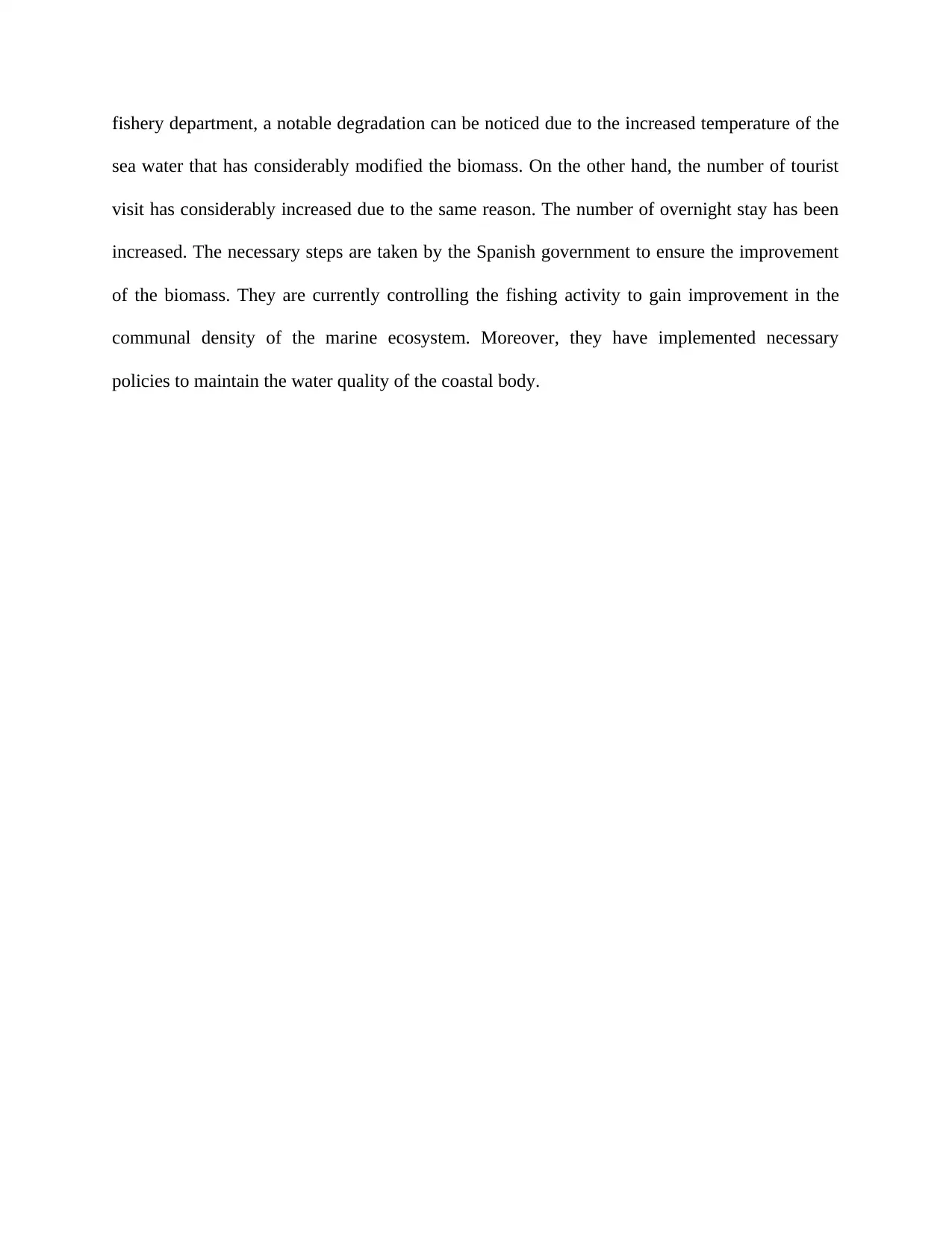
fishery department, a notable degradation can be noticed due to the increased temperature of the
sea water that has considerably modified the biomass. On the other hand, the number of tourist
visit has considerably increased due to the same reason. The number of overnight stay has been
increased. The necessary steps are taken by the Spanish government to ensure the improvement
of the biomass. They are currently controlling the fishing activity to gain improvement in the
communal density of the marine ecosystem. Moreover, they have implemented necessary
policies to maintain the water quality of the coastal body.
sea water that has considerably modified the biomass. On the other hand, the number of tourist
visit has considerably increased due to the same reason. The number of overnight stay has been
increased. The necessary steps are taken by the Spanish government to ensure the improvement
of the biomass. They are currently controlling the fishing activity to gain improvement in the
communal density of the marine ecosystem. Moreover, they have implemented necessary
policies to maintain the water quality of the coastal body.
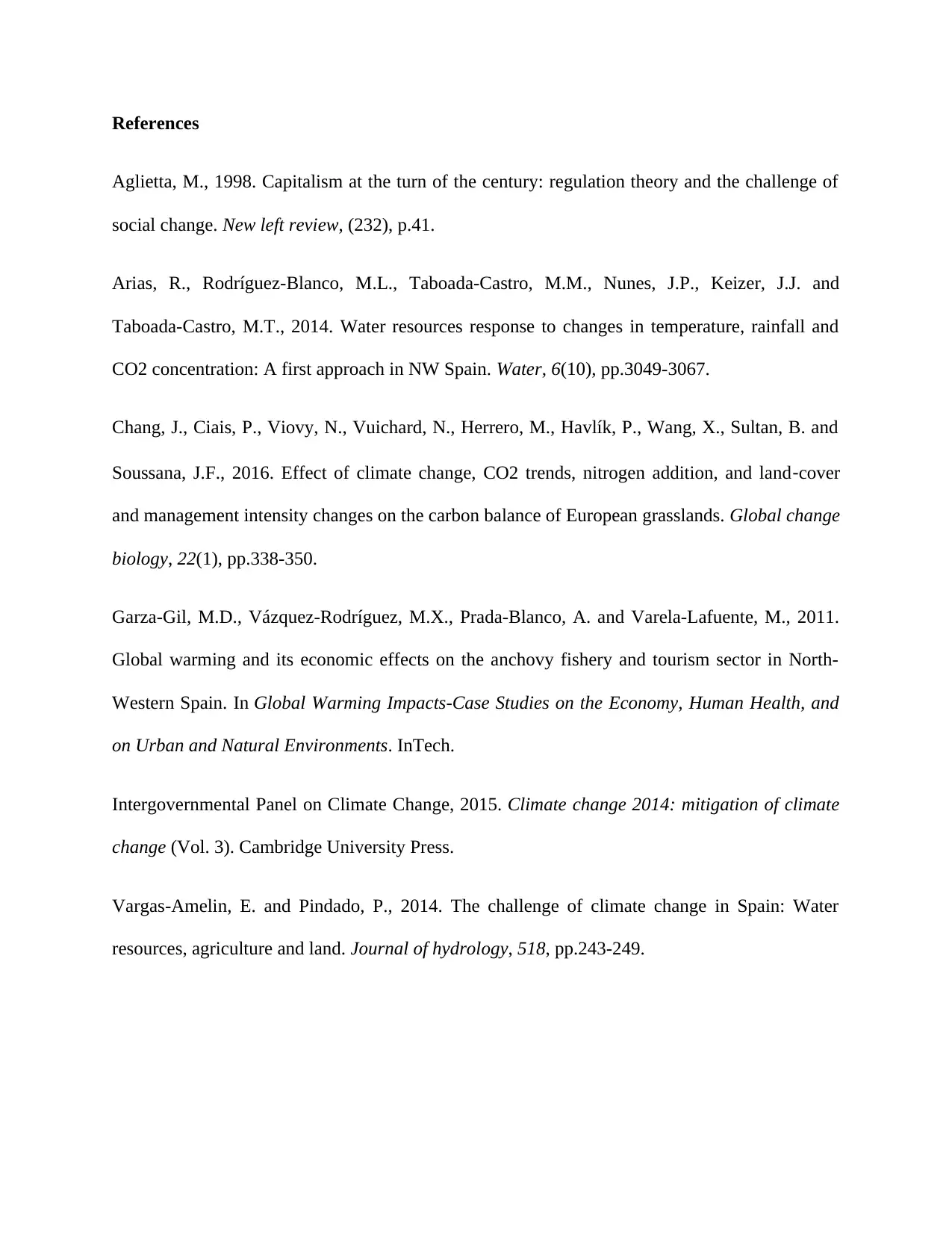
References
Aglietta, M., 1998. Capitalism at the turn of the century: regulation theory and the challenge of
social change. New left review, (232), p.41.
Arias, R., Rodríguez-Blanco, M.L., Taboada-Castro, M.M., Nunes, J.P., Keizer, J.J. and
Taboada-Castro, M.T., 2014. Water resources response to changes in temperature, rainfall and
CO2 concentration: A first approach in NW Spain. Water, 6(10), pp.3049-3067.
Chang, J., Ciais, P., Viovy, N., Vuichard, N., Herrero, M., Havlík, P., Wang, X., Sultan, B. and
Soussana, J.F., 2016. Effect of climate change, CO2 trends, nitrogen addition, and land‐cover
and management intensity changes on the carbon balance of European grasslands. Global change
biology, 22(1), pp.338-350.
Garza-Gil, M.D., Vázquez-Rodríguez, M.X., Prada-Blanco, A. and Varela-Lafuente, M., 2011.
Global warming and its economic effects on the anchovy fishery and tourism sector in North-
Western Spain. In Global Warming Impacts-Case Studies on the Economy, Human Health, and
on Urban and Natural Environments. InTech.
Intergovernmental Panel on Climate Change, 2015. Climate change 2014: mitigation of climate
change (Vol. 3). Cambridge University Press.
Vargas-Amelin, E. and Pindado, P., 2014. The challenge of climate change in Spain: Water
resources, agriculture and land. Journal of hydrology, 518, pp.243-249.
Aglietta, M., 1998. Capitalism at the turn of the century: regulation theory and the challenge of
social change. New left review, (232), p.41.
Arias, R., Rodríguez-Blanco, M.L., Taboada-Castro, M.M., Nunes, J.P., Keizer, J.J. and
Taboada-Castro, M.T., 2014. Water resources response to changes in temperature, rainfall and
CO2 concentration: A first approach in NW Spain. Water, 6(10), pp.3049-3067.
Chang, J., Ciais, P., Viovy, N., Vuichard, N., Herrero, M., Havlík, P., Wang, X., Sultan, B. and
Soussana, J.F., 2016. Effect of climate change, CO2 trends, nitrogen addition, and land‐cover
and management intensity changes on the carbon balance of European grasslands. Global change
biology, 22(1), pp.338-350.
Garza-Gil, M.D., Vázquez-Rodríguez, M.X., Prada-Blanco, A. and Varela-Lafuente, M., 2011.
Global warming and its economic effects on the anchovy fishery and tourism sector in North-
Western Spain. In Global Warming Impacts-Case Studies on the Economy, Human Health, and
on Urban and Natural Environments. InTech.
Intergovernmental Panel on Climate Change, 2015. Climate change 2014: mitigation of climate
change (Vol. 3). Cambridge University Press.
Vargas-Amelin, E. and Pindado, P., 2014. The challenge of climate change in Spain: Water
resources, agriculture and land. Journal of hydrology, 518, pp.243-249.
⊘ This is a preview!⊘
Do you want full access?
Subscribe today to unlock all pages.

Trusted by 1+ million students worldwide
1 out of 6
Related Documents
Your All-in-One AI-Powered Toolkit for Academic Success.
+13062052269
info@desklib.com
Available 24*7 on WhatsApp / Email
![[object Object]](/_next/static/media/star-bottom.7253800d.svg)
Unlock your academic potential
Copyright © 2020–2026 A2Z Services. All Rights Reserved. Developed and managed by ZUCOL.





